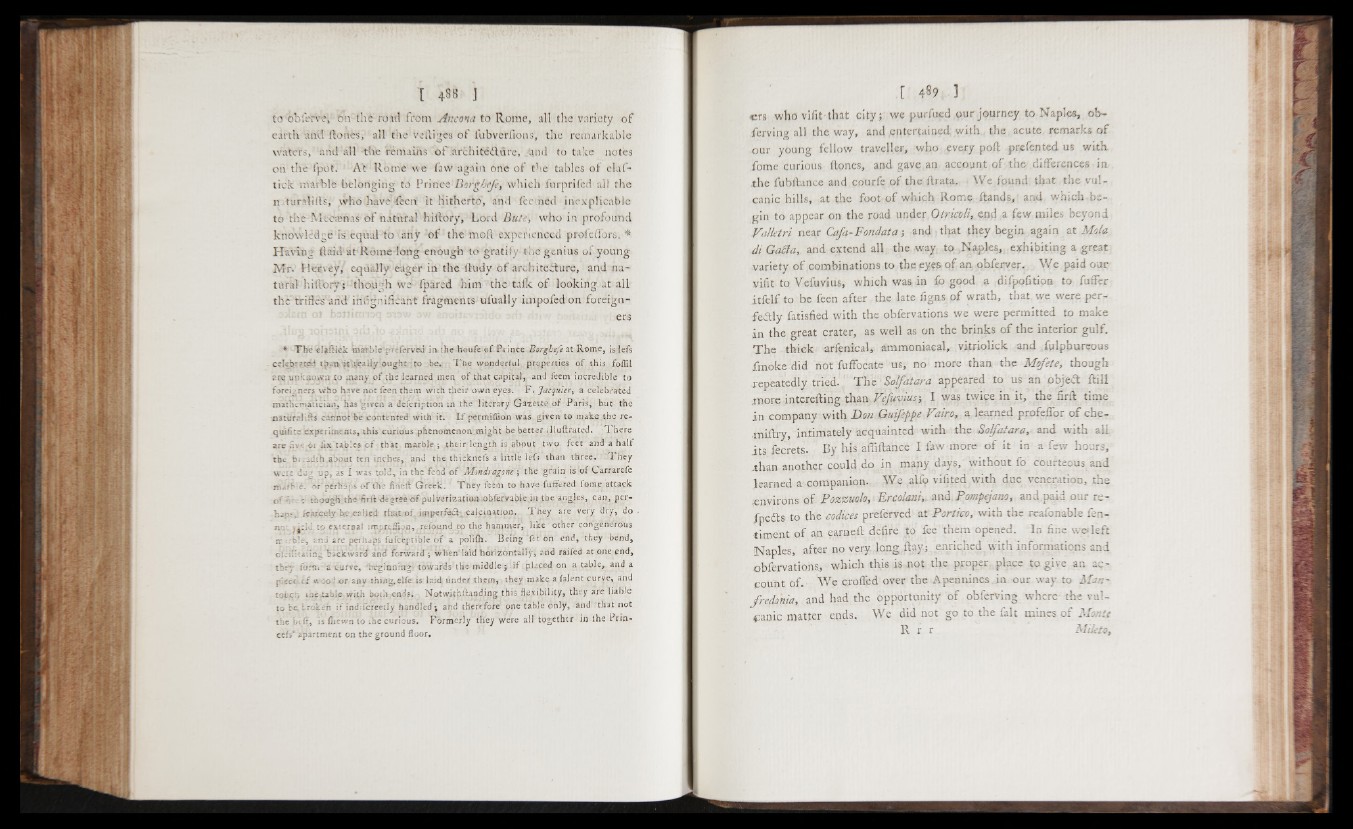
to obferve, On the roul from Ancona to Rome, all the variety o f
earth anü itonés-, all the veftiges o f fubverlions, the remarkable
waters, anti all the remains o f architedlure, .find to take notes
on the ipot. At Rome we faw again one o f the tables of eltif-
tick marble belonging to Prince Borghtfe, which furpriled all the
n. turaliils, who have feen it Hitherto, and itemed inexplicable
to the M entenas o f natural hiftory, Lord Bute, who in profound
knowkdge is equal to any of the moil experienced profeflors. *
Having ilaid at Rome long enough to gratify the genius of young
Mr. Hervey; equally eager in the iiudy o f architecture, and natural
hiitbry; though we lpared him the talk of looking at all
the trifles and insignificant fragments ufually impofedon foreigners
* The eUftiek marble p'réíervéa in the houfe of Prince Eorghefe at Rome, is iefs
celebrated th^n it -,i;eaUy ought ¿to be. The wonderful properties of this foflii
ere unksowa to many of the learned men of that capital, and feem incredible to
foreigners who have not feen them with their own eyes. F. Jacquiery a celebrated
mathematician, has given a deicription in the literary Gazette of Paris, but the
naturalifts cannot be contented with it. If pérmiffion was given to make ,the re-
quillte experiments, this curious phenomenon migiht be better ¡lluftrated. *1 here
are nve or fix tables of that marble; their length is abput two feet and a half
the breadth about ten inches, and the thicknefs a little lefs than three. I hey
were duo; up, as I was told, in the feod of Mmdragowe ; the grain is of Carrarefe
marh e. oPperhaps of the nrieft Greek. They feérii to have fuffered fome attack
of ñrfe though the firffe degree of pulverization obfervabie.in .the angles, can, perhaps,
iearcely be -called that of iinperfe¿f+ calcination. T. hey are very dry, do
no >i-id :o external imprtüion,,refound to the hammer, like other congenerous
irirble, ana are perhaps fufceptibie of a polifh. Being fet on end, they bend,
oícüítatiñi backward and forward ; when laid horizontally', and raifed atone end,
they form a curve, ‘beginning- towards the middle- if placed on atable, anda
piece c£ wood or any thing.elfe.is laid under them, they make a falent curve, and
roñen ihelabje with both ends. Notwit'pPcanding this flexibility, they are liable
to fee. broken if indifcreetly handled; and therefore one table only, and that not
the btit, is ibewn to the curious. Formerly they were all together in the Prin«
cefs* apartment on the ground floor.
crs who vifit that c ity ; we purfued our journey to Naples, ob-
ierving all the way, and entertained with the acute remarks o f
our young fellow traveller, who every poft prefented us with
fome curious flones, and gave an account o f the- differences ia
.the fubilunce and courfe of the ftrata. We found that the vulcanic
hills, at the foot o f which Rome ftands, and which begin
to appear 011 the road under Otricoli, end a few miles beyond
Valletri near Cafa-Fondata; and that they begin again at Mola
di GaSta, and extend all the way to .Naples, exhibiting a great
variety o f combinations to the eyes o f an, obferver. We paid our
vifit to Vefuvius, which was, in fo good a difpofitioa to fuifer
itfelf to be feen after the late figns o f wrath, that we were perfectly
fatisfied with the obfervations we were permitted to make
in the great crater, as well as on the brinks o f the interior gulf.
The thick arfenical, ammoniacal, vitriolick and .fulphureous
frnoke did not fuffocate us, no more than the Mofete, though
repeatedly tried.' The Solfatara appeared to us an objeft ilill
.more interefting than Vejuvius-, I was twice in it, the firft time
in company with Bon Guifeppe Vair.o, a learned profeffor o f che-
■miftry, intimately acquainted with the Solfatara, and with all
its fecrets. By his.aifliftance I law more o f it in a few hours,
.than another could do in many days, without fo courteous and
learned a-companion. We alfo vifited with due veneration, the
¿environs of Pozzualo, Ercolani,. and, Pompejano, and paid our re-
fpedts to the codices preferved at Portico, with the reafonable fen-
timent o f an earneil defire to fee them opened. In fine we* left
Naples, after no very long lbays enriched with informations and
obfervations, which this is not the proper place to give an account
of. We croifed over the Apennines.in our way to Afait-
fredonia, and had the opportunity of obierVing wh^.re the ^ ul—
canic matter ends. We did not go to the fait mines o f Monte
R r r Mileto,